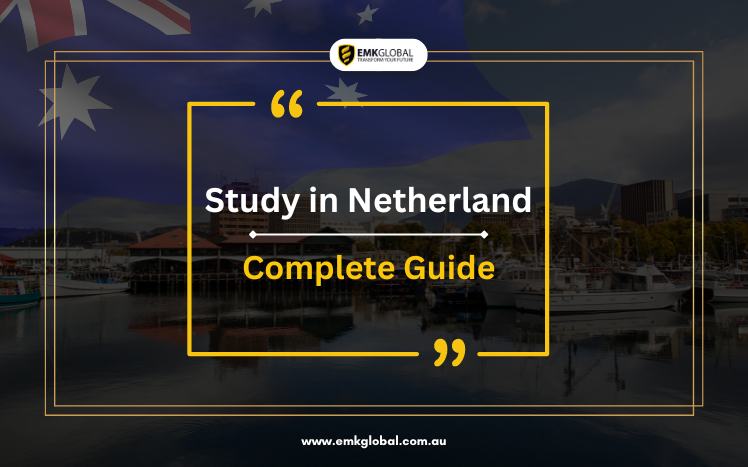
Introduction
When it comes to more affordable education, a diversified environment, better-quality instruction, and reaching career goals, the Netherlands is among the greatest destinations in Europe for international students. Through a programme called International Education in English, which attracts more than 4200 people annually, the country offers more than 400 different study programmes and courses. The intended audience for this programme is postgraduate students or individuals with some previous work experience. A certificate is awarded for the majority of these English-taught, practice-focused courses. The Netherlands is renowned for its programmes in astronomy, medicine, agriculture sciences, civil engineering, and management studies.
Types of Netherlands Student Visa
While enrolled at their preferred university, students may apply for one of two types of Netherlands student visas:
- A short-stay visa or a Schengen visa is required for candidates who intend to study in the Netherlands for ninety days or less.
- They will require both a residence permit (VVR) and an entry visa (MVV) if they plan to study in the Netherlands for more than ninety days.
Similar to a short-term visa, an application for a residence permit or VVR must be submitted with the MVV in order for it to be valid for 90 days.
Requirements for a Netherland’s Students Visa
- Filled out application for a visa
- A valid passport
- Two images
- Birth certificate
- Transcripts of studies
- Official correspondence from the Dutch academic institution
- Describe your interest in the subject matter and how and why it relates to your previous studies in your study plan in its entirety.
- Proof of finances for the full study duration (about 870 EUR/month)
- Health and travel insurance
- Application fee for a visa (174 EUR)
- Test for tuberculosis (mandatory for citizens of certain countries)
- Biometric data
Post-Secondary Institutes
In the Netherlands, there exist several categories of post-secondary educational establishments that your pupils may like to explore. Because of the distinctions made by the Dutch higher education system between academic education (WO) and vocational education (HOGER BEROEPSONDERWiJS), some of these are highly different from one another.
Students studying in the Netherlands can generally anticipate taking one of three courses:
- A degree that is more academically and research-based, with coursework typically spanning three years.
- Degree programmes with a practical or vocational focus that include a work experience or a year spent in business.
- Degrees in the liberal arts type, which are comparable to liberal arts institutions in the USA, allow students to take a wider range of disciplines before concentrating.
Research Universities while Studying in Netherlands
Depending on what they choose to study, students at research institutions can expect to graduate with any of the following degree qualifications:
- 3 years for a bachelor of arts (BA).
- Three years for a Bachelor of Science (BSc).
- 1-3 years for a Master of Arts (MA) degree.
- 1-3 years for a Master of Science (MSc) programme.
- 3 years for an LLB (bachelor of law) degree.
- A one-year LLM (Master of Laws) programme.
Tuition Fee and Living Costs
For students from the Netherlands and the EU, the standard tuition cost at Dutch universities is around EUR 2314 (for 2023–2024).
On the other hand, non-EU passport holders’ international student fees are more costly and subject to change. Generally speaking, one should budget between 6000 and 15000 EUR a year for a bachelor’s degree, 14,000 EUR per year for a liberal arts degree at a university college, and up to 32,000 EUR per year for disciplines like medicine.
However, keep in mind that private institutions have the freedom to determine their own fees, thus costs might vary greatly.
Because of this, studying in the Netherlands can be more affordable depending on the subjects chosen, with the typical undergraduate degree taught in English costing less than those in the USA, Australia, or even Canada.
Scholarships
International students who want to study in the Netherlands have several scholarship options! Some are niche, which means they are exclusively available to specific groups of people (like women of color) or topics (like pharmacology). Some are also exclusive to a certain university.
Others are more universal, like the Study in Holland scholarship, which is available to all overseas students. In addition to using the internet to look into choices, students should always think about getting in touch with their university directly.
Working While Studying in Netherlands
Depending on your country, you may require a work permit in order to work while studying in the Netherlands.
EU/EEA citizens (barring Croatia), Swiss nationals, and Japanese nationals are exempt from work permit requirements and hourly wage caps. Only the employer or employment agency may apply for the work permit on behalf of Croatian and other national citizens, who require one in order to work.
During the summer, international students are permitted to work a maximum of 10 hours a week or full-time.
Conclusion
Studying in the Netherlands is becoming more and more popular among international students, for both full-time study and study abroad programmes (consider semester or year-long exchanges, like through Erasmus): In 2022, 115,000 foreign students enrolled in full-time university programmes in the Netherlands. Studying in the Netherlands provides a wide range of academic opportunities in addition to a selection of locations in which students can live and work, much like some of its European neighbors.
Furthermore, with more affordable tuition, the Netherlands’ higher education options now compete with those of the United States, the United Kingdom, and Canada thanks to the expansion of English-taught courses.


